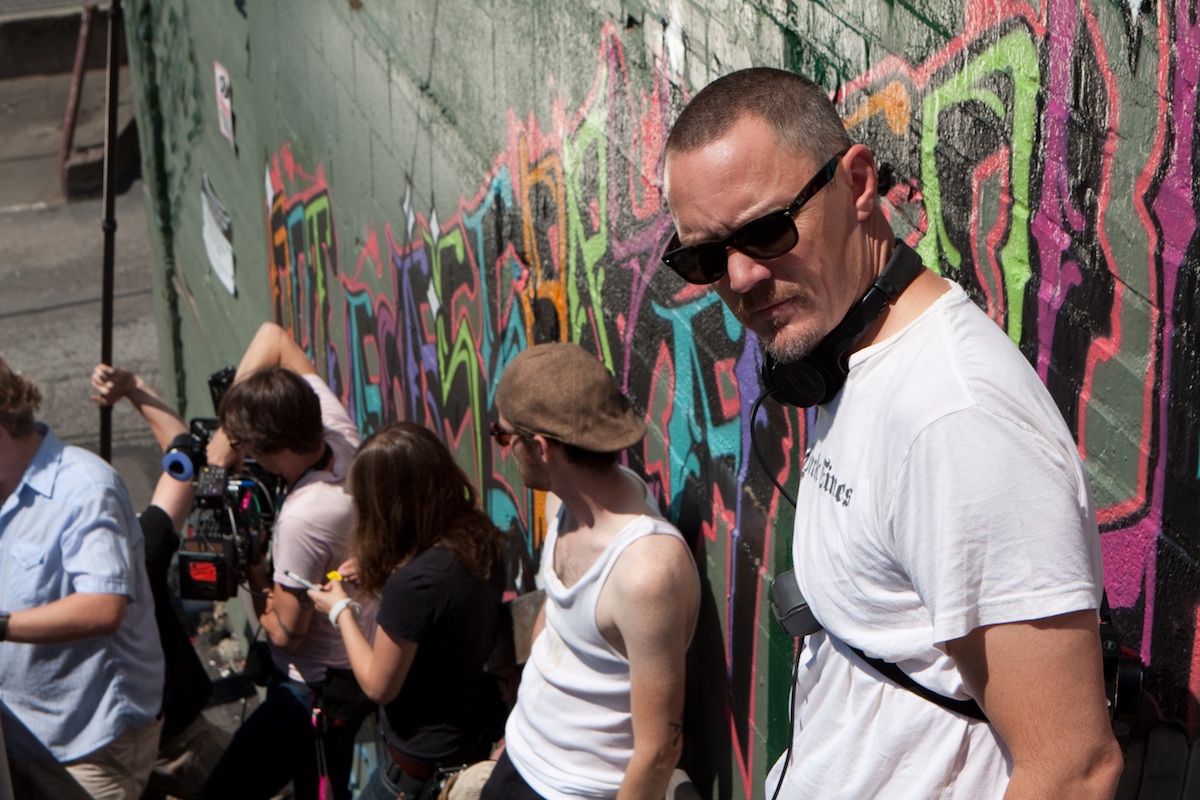Matthew Lillard Does Punk Proud

ABOVE: MATTHEW LILLARD (FAR RIGHT) ON THE SET OF FAT KID RULES THE WORLD.
At one point, Matthew Lillard was arguably the best contender for the ’90s incarnation of Jon Cryer’s Duckie syndrome. After all, it was around that time the actor could be seen playing goofy sidekicks in movies like Scream. However, Lillard had the enthusiasm to stretch his talents and eventually struck gold by playing Stevo in SLC Punk!, which wound up being a pertinent voice for the teen punk subculture.
13 years later, Lillard’s directorial debut, Fat Kid Rules The World, could easily be one of the best love notes to the punk culture for the next generation of kids. Based on the novel by K.L. Going, Fat Kid focuses on Troy, an obese, invisible loner, who’s on the outside looking in on his peers—but who maintains a certain acutely aware sense of self. Through comically warped suicidal visions and daydreams, this story could have been told as a 10 o’clock news puff piece; but it’s the same subversive humor Lillard is so good at bringing forth with his own characters that makes this film stand out.
Amid messages of hope and support from mainstream celebrities chanting slogans of positivity from anti-bullying campaigns, Lillard offers a more grounded approach to the subject, capturing the world through the eyes of a teen experiencing the world for the first time. It’s hard to deny Fat Kid the praise when it has such a big heart, equally matched by that of Lillard himself.
NIKI CRUZ: In many ways this film is a throwback to the ’90s films that focused on teens not belonging to a certain group. It was very familiar to SLC Punk!, which you had success with.
MATTHEW LILLARD: Yeah, sure. I keep on saying we’re a bit of a sister piece to that movie. Make no mistake, we made this film because I know the power that SLC Punk! had on kids. There’s a world of disenfranchised punk-rock kids all over America that need someone to tell stories about them. I just think that if you make a movie that respects the demographic, and it makes for a good movie, people will show up to support it.
CRUZ: Did you know the SLC Punk! was going to be so big at the time?
LILLARD: No, God, no! I had no idea. The reason I think it is so big is because it’s made without any of those pretenses. It wasn’t worried about finding an audience. That movie was really about telling a story of those kids. Nobody had any kind of notion that it would be big at all. In fact, even today, the co-president Tom Bernard of Sony Pictures Classics was blown away by what it has done over the last 15 years.
CRUZ: Do you think Fat Kid Rules The World will have the same fate, or do you not want to try and predict that?
LILLARD: It’s so funny—I don’t know. I don’t know how we’re going to find people or how they’re going to see the film. I mean, we have really innovative techniques to get it to people. We have this thing called “tuggthefatkid.com,” so that any kid across America can go to tuggthefatkid.com and set up a screening of our movie in any theater across the US. We were on the Warped Tour and hit 750,000 kids—that was super innovative and exciting. We did reddit.com and touched hundreds of thousands of people, and it’s just a matter of, “Can you motivate them to see the movie?”
CRUZ: Let’s talk about Kickstarter. How did you start with the campaign?
LILLARD: Well, we looked at each other and we knew we had a great experience at the SXSW festival and then people went bananas for it. We had crazy reviews. We’re still at 97% at Rotten Tomatoes. We knew that we had something special, so when all the offers came in from the studios—and they were just trying to fill a piece of their platform on VOD, and never really gave us an opportunity to make money back—that’s fine and dandy, but we would rather bet on ourselves than sell out. That’s why we ended up striking out on our own, and to do that, we went to Kickstarter.
CRUZ: What made you get into directing? You’re known for a lot of your film roles.
LILLARD: It’s always kind of been in my DNA. When I was in high school, I was directing. It sounds weird, but when I was 19, I started a theater company. When I was 21, I started another theater company. I’ve always been a guy that doesn’t do well waiting for people to say, “You can act.” It’s always been a part of me. I did author K.L. Going’s book on tape, and I saw this story as an opportunity to tell a really kick-ass, tiny movie. I saw a story that can make an impact and could be funny and dramatic in the same breath. I jumped on that 10 years ago, and it took us 10 years to get the movie made. At the end of the day, it’s been an amazing ride.
CRUZ: What exactly attracted you to doing this film particularly? Was it wanting to tell a story about those characters?
LILLARD: It was. It was the success that SLC Punk! had over the years. That kids have loved that movie for years. I had a real strong sense that there was a group of kids that would support this movie. Look, I was that kid in high school. I was the kid that was lost. I was the kid that was on the outside looking in. I saw myself reflected in Troy in a really emotional way, and that’s why I wanted to tell the story.
CRUZ: You seem pretty comfortable about your role as a director. Is this something that’s more fulfilling as opposed to acting?
LILLARD: 100 percent! It’s not even a close second; it’s so much more satisfying and fulfilling. My first love is acting, but the reality is that I just don’t get too many opportunities to stretch, and grow, and inspire myself as an actor, certainly not in terms of where I make money. Yeah, I can go off and do a play, but the reality is as a profession, directing is exponentially more satisfying.
CRUZ: The presence of punk rock as a culture in the film is incredibly strong. Could you break down how you approached integrating that world into the film?
LILLARD: To me it was important to represent the punk rock scene in a real, authentic way. If we can’t get that right, and go all Hollywood on the punk stuff, then we lose our suspension of disbelief. I still think that this is a Hollywood version of punk rock, but at least it’s closer to the real thing than 99 percent of Hollywood films out there making that movie. You know, we can’t show a bunch of kids getting high and huffing paint, and breaking stuff, but we got as close as we could. And you know, that was my version of it while growing up in Orange County, which goes back to the things that I remember while growing up in that world. To me, the punk rock kids I grew up with were really, really smart, and to me, respecting those kids was a really big deal.
CRUZ: The scenes focusing on Troy’s desires through his daydreams were incredibly unique and brought a great dark sense of humor to the film. Where did you get the idea to frame his daydreams as a narration for his desires?
LILLARD: Well, it’s an element of the book—these fantasy sequences that appear as headlines in tomorrow’s papers—so we just took that and added a cinematic feel to it. He’s an outsider and doesn’t really have anyone to share experiences with, by virtue of the fact that he’s an outsider and he doesn’t have friends, so we needed some way to see into his life and into who he was, and we just felt like those things really served the purpose.
CRUZ: In a lot of ways, this film was about witnessing a kid seeing the world for the first time. Did that make you reminisce about your own high school experience?
LILLARD: Yeah, to some extent. There are definitely elements. There are a lot of things that those boys do that came from me in some capacity. I did a big rewrite of the script to add idiosyncratic beats that I thought that pulled on my life. In the most part it was a combination of the collaboration between K.L., the writers, the actors, and myself. As those beats come, the idiosyncratic nuances appeared in the performances, and it gave those performances great depth.
FAT KID RULES THE WORLD IS CURRENTLY IN SPECIAL SCREENINGS NATIONWIDE. TO REQUEST A SCREENING, VISIT THE FILM’S WEBSITE.






